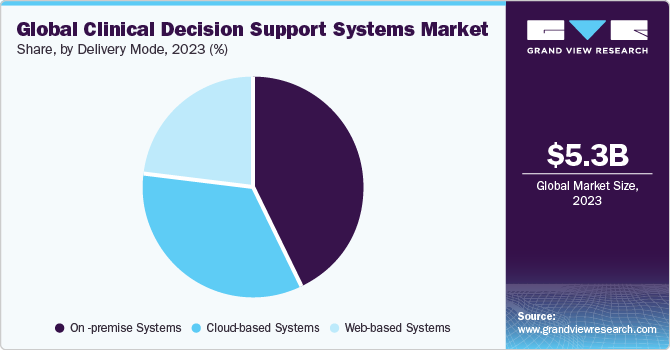The global market for clinical decision support systems (CDSSs) was valued at approximately USD 5.30 billion in 2023 and is anticipated to expand at a compound annual growth rate (CAGR) of 10.79% from 2024 to 2030. CDSSs have seen remarkable advances over recent decades, equipping clinicians with essential tools for making well-informed patient care decisions. These systems show great potential for improving patient outcomes while also helping reduce overall healthcare expenses.
Artificial intelligence (AI) and machine learning (ML) are significantly enhancing the CDSS market, introducing sophisticated functionalities such as predictive analytics, pattern recognition, and tailored recommendations. AI-powered CDSSs analyze vast datasets, identify patterns, forecast outcomes, and recommend optimal treatments. For example, researchers from the University of Texas at Austin’s Dell Medical School developed an AI-based CDSS in December 2022 to assist clinicians in discussing nutrition and guiding dietary decisions with patients.
Gather more insights about the market drivers, restrains and growth of the Global Clinical Decision Support Systems Market
With the rise of personalized medicine, CDSSs are increasingly vital. These systems analyze data, including genetic profiles and medical histories, to create individualized treatment plans, enhancing the efficacy of treatments and reducing the likelihood of adverse reactions, thereby driving market growth.
Governments globally are implementing regulations and incentives that encourage the adoption of CDSS and other healthcare IT solutions. These measures aim to improve patient safety, interoperability, and care quality, leading healthcare providers to invest in CDSS to meet regulatory standards and qualify for incentives.
The COVID-19 pandemic has also accelerated the market’s growth, increasing the use of CDSS. These systems have proven crucial in patient care, particularly in diagnosing and triaging COVID-19 cases in real-time. Several countries introduced online CDSS-based services to meet patient needs, fueling market expansion. During the pandemic, companies launched new CDSS tools for COVID-19 management. For instance, Epocrates introduced a new tool in May 2022 for managing long COVID-19, incorporating the latest guidelines and insights, further driving market growth.
Application Insights
In 2023, the drug allergy alerts segment held the largest revenue share, over 25.0%, due to its prevalent use in CDSSs to improve patient safety by preventing adverse drug reactions (ADRs). CDSSs enable customization of alerts based on individual patient profiles and specific allergies, allowing healthcare providers to set tailored alert preferences to enhance relevance and effectiveness. Growing concerns about drug allergies, such as the CDC's estimate that approximately 10% of the U.S. population is allergic to penicillin, are driving this segment’s growth.
The clinical guidelines segment is projected to grow at the fastest CAGR over the forecast period. CDSS systems support clinical teams by providing diagnosis and treatment guidelines at the point of care, delivering real-time information, automating tasks, and alerting clinical staff to potential issues. According to the American Medical Informatics Association (AMIA), CDSS plays a critical role in improving health-related decision-making, empowering clinicians, patients, and stakeholders to optimize clinical care quality and outcomes.
Component Insights
In 2023, the services segment dominated the CDSS market, with a revenue share of 42.49%. This segment includes essential services like implementation, training, support, customization, and consulting, helping healthcare providers leverage CDSS software for optimized clinical decision-making. Continuous technical support is crucial to ensure CDSS functionality, while training healthcare professionals to use the systems effectively also contributes to segment growth.
The software segment is anticipated to experience the fastest CAGR over the forecast period. Integrated with Computerized Physician Order Entry (CPOE) and Electronic Health Record (EHR) software, CDSS software delivers enhanced decision-making capabilities tailored to individual patients. Technological advancements in technical support, interoperability, and efficient outcomes are expected to drive market growth. For example, Elsevier Health introduced ClinicalKey AI in February 2024, the first generative AI-powered CDSS tool in the U.S., combining the latest medical content with advanced AI to assist clinicians at the point of care.
Order a free sample PDF of the Clinical Decision Support Systems Market Intelligence Study, published by Grand View Research.
